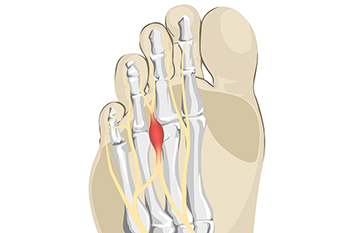
The digital nerve in the feet is defined as the nerve that transports sensations to and from the toes. If this nerve becomes irritated or inflamed, it can cause severe pain and discomfort, often causing difficulty in walking. Morton’s neuroma is a foot condition that affects women more than men, and this can be a result of frequently wearing high heels. These types of shoes generally have limited room for the toes to move freely in, and the digital nerve can become compressed. It is located between the third and fourth toes, and the sensation that is felt can be likened to having a marble in the shoe. Additional symptoms can include a numbing feeling, and pain may occur in the ball of the foot. Relief is often found when high heels are eliminated, and it is suggested to wear shoes that are flat or have a lower heel. If you are afflicted with Morton’s neuroma, please speak to a podiatrist who can guide you toward the correct treatment options, which may include surgery for repair or removal of the nerve.
Morton’s neuroma is a very uncomfortable condition to live with. If you think you have Morton’s neuroma, contact one of our podiatrists of Pennsylvania. Our doctors will attend to all of your foot care needs and answer any of your related questions.
Morton’s Neuroma
Morton's neuroma is a painful foot condition that commonly affects the areas between the second and third or third and fourth toe, although other areas of the foot are also susceptible. Morton’s neuroma is caused by an inflamed nerve in the foot that is being squeezed and aggravated by surrounding bones.
What Increases the Chances of Having Morton’s Neuroma?
- Ill-fitting high heels or shoes that add pressure to the toe or foot
- Jogging, running or any sport that involves constant impact to the foot
- Flat feet, bunions, and any other foot deformities
Morton’s neuroma is a very treatable condition. Orthotics and shoe inserts can often be used to alleviate the pain on the forefront of the feet. In more severe cases, corticosteroids can also be prescribed. In order to figure out the best treatment for your neuroma, it’s recommended to seek the care of a podiatrist who can diagnose your condition and provide different treatment options.
If you have any questions, please feel free to contact one of our offices located in Plymouth Meeting and Ambler, PA . We offer the newest diagnostic and treatment technologies for all your foot care needs.
